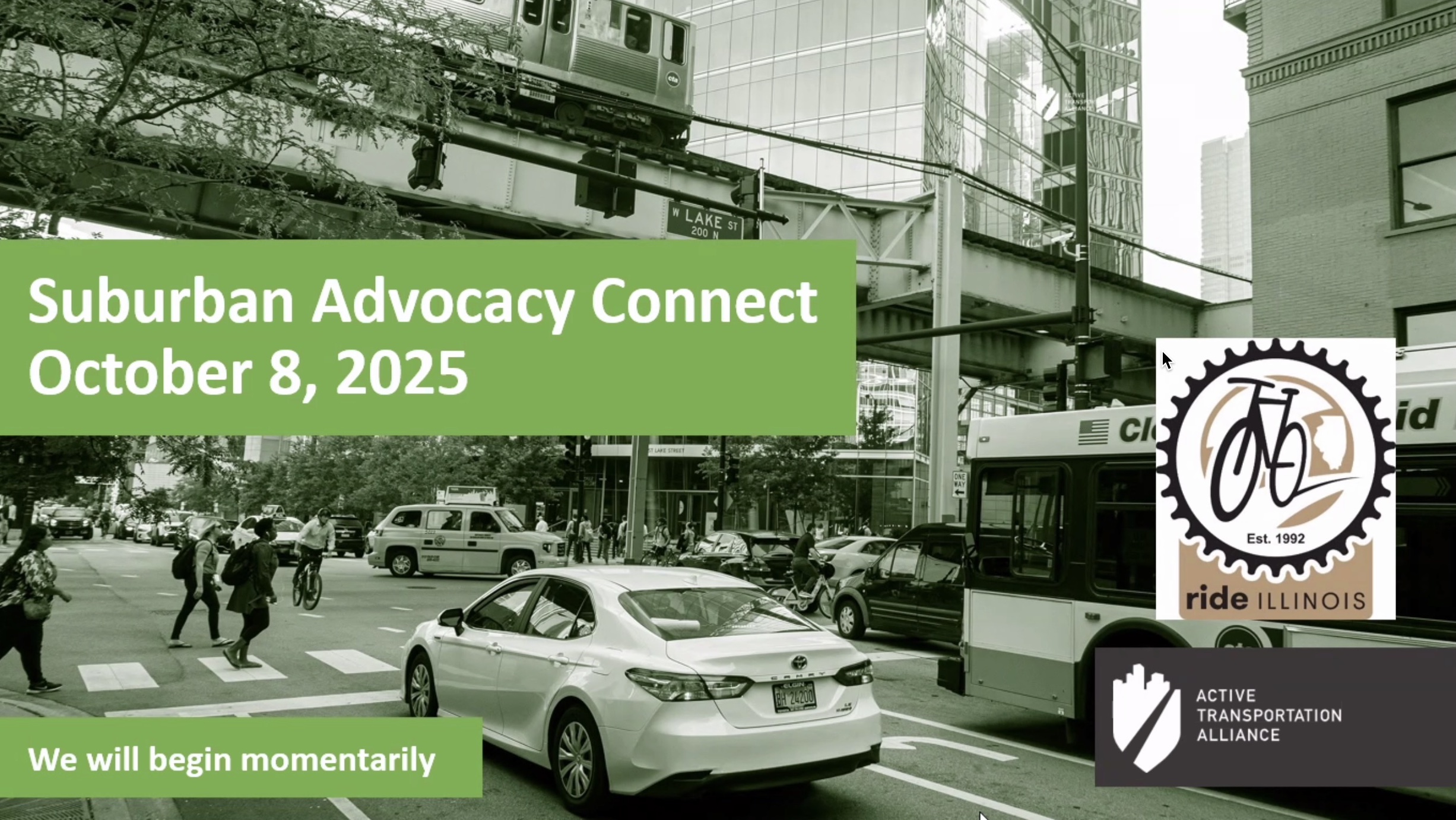
Last month, when I interviewed State Rep. Kam Buckner about efforts to address the looming $771 million Chicagoland transit fiscal cliff, he noted that the discussion of the topic in the media has been something of a "boy's club." (Today, Buckner and I talked some more about this subject with Outside the Loop Radio's Mike Stephen on a show airing this Saturday morning, which doesn't undermine that argument.)
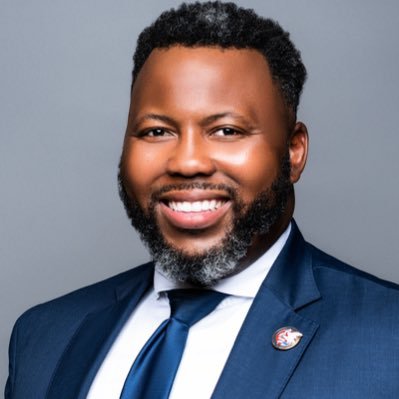
As such, Buckner encouraged me to reach out to House Majority Leader Eva-Dina Delgado, his co-leader of the chamber's Public Transit Working Group. They're trying to overcome a challenging legislative conundrum to pass a reform and funding law that will save and upgrade bus and train service.
So I did just that, interviewing Delgado a couple weeks ago. She has extensive transit expertise, having previously served as the CTA's first Latina Vice President of Government and Community Relations. "The goal is to finalize legislative language this summer and make sure we get a bill passed between both chambers [during the six-day veto session in October] before before any of those service boards have to make any Draconian cuts," she told me.
Recently I saw a notice about a panel discussion of this topic Tuesday at the Center on Halsted, an LGBTQ community center at 3656 N. Halsted St. in Lakeview, offering a fresh perspective. Along with Delgado, the speakers would include local state representatives Ann Williams and Kelly Cassidy, as well as Active Transportation Alliance Executive Director Amy Rynell.
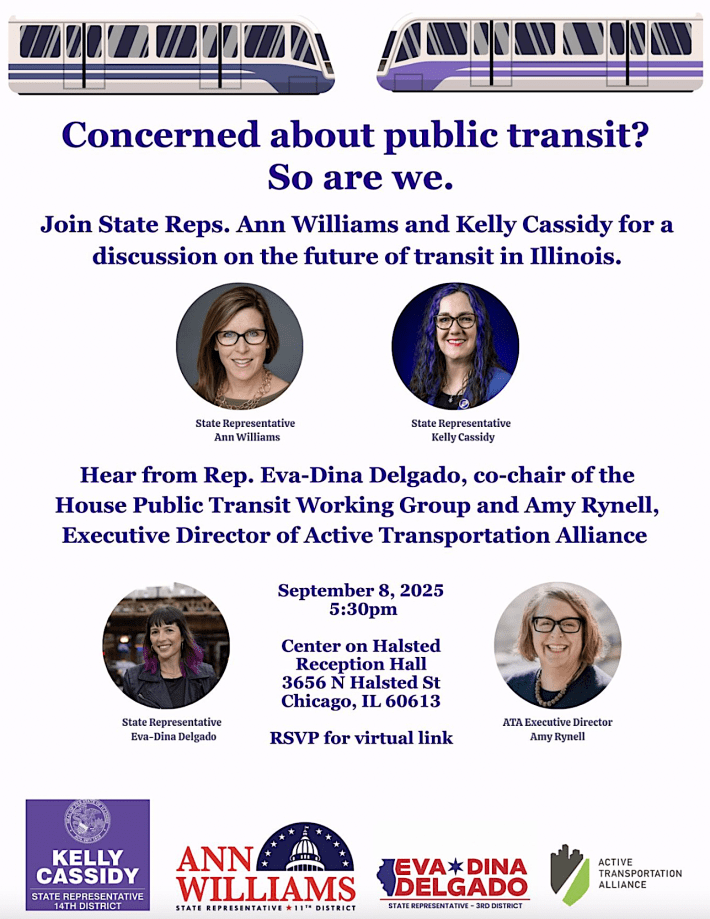
Williams kicked off the event, mentioning that her district includes transit-rich Lakeview, and many of her constituents are worried about the upcoming budget gap, especially after the General Assembly failed to pass a bill last spring. "We share your concern about what's happening or, more importantly, what has not happened yet in Springfield," she said. Therefore the evening's discussion would include some of the key players in the current legislative drama.
Next Cassidy, whose district includes Chicago's lakefront neighborhoods north of Foster Avenue, with crucial Red Line and Metra access, addressed the room. She added that this area has "probably the highest concentration of bus users along the lakefront as well, via the Sheridan Road condo canyon."
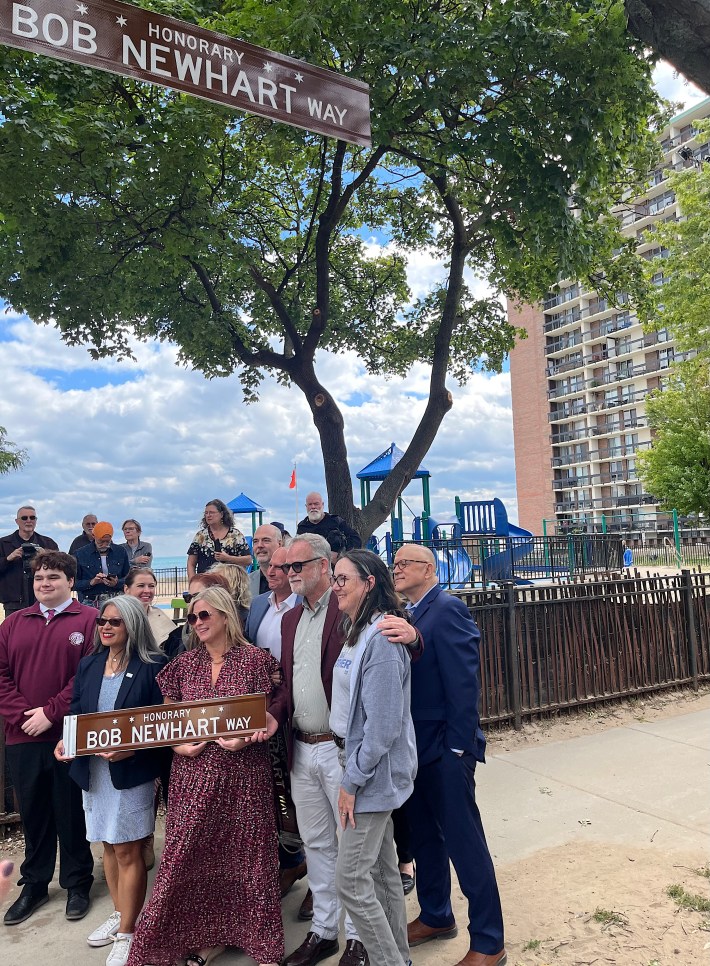
Cassidy said she's confident that Delgado has the necessary skills to help solve the complex transit governance and funding puzzle. In addition to being a former CTA staffer, she said, the House leader is "a longtime legislative strategist, and so knows the inner workings of the systems, and knows how to lead a working group like this."
After that, Ald. Matt Martin (47th) was invited to give some brief remarks about his work advocating for transit, and he noted that the Brown Line and Metra are also key elements of his district. He said Chicago's good public transportation was a factor in him deciding to settle here after moving from Arizona, and he usually takes the 'L' to City Hall. "This isn't a theoretical issue for us," he said. "When we're talking about needing more housing, we build more housing in the 47th Ward when transit is frequent, reliable, and safe."
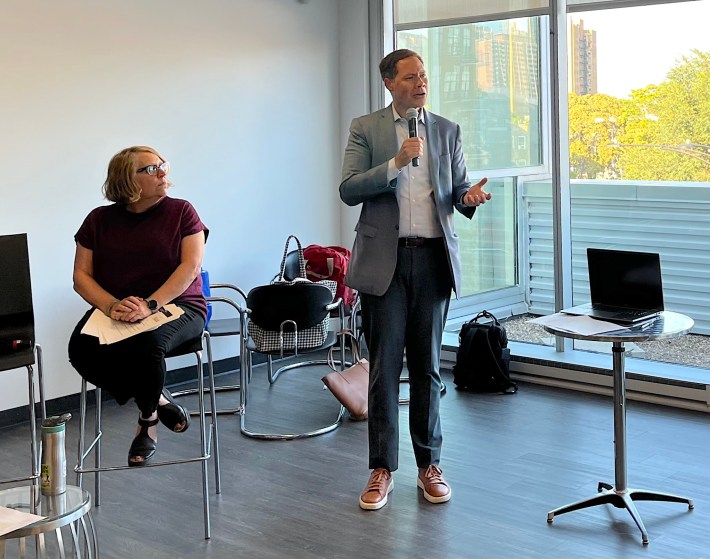
Cassidy added that, like Martin, her three sons use public transportation to get around instead of driving. She said her youngest son even "plays 'Planes, Trains, and Automobiles' every day" to get to a job in suburban Schaumburg, instead of driving there.
Cassidy mentioned this website because we "posted today that transit [the Chicagoland transit funding discussion] tends to be a male-oriented space." She added, "So I'm very excited to welcome you to 'Four Broads Talking Transit.'" The crowd laughed.
Next, Rynell discuss the research, discussion and public input process that has lead up to the current moment. Starting a few years ago, decision-makers and advocates spent some 16,000 total hours brainstorming the Chicago Metropolitan Agency for Planning's Plan of Action for Regional Transit. "The legislature saw this coming," she said. The document creation process sought to determine, "what is the system we want, how are we going to fund it, and how are we going to get there." Rynell summarized in a few slides what they "learned from that process, and what led to the legislation that's being debated today."
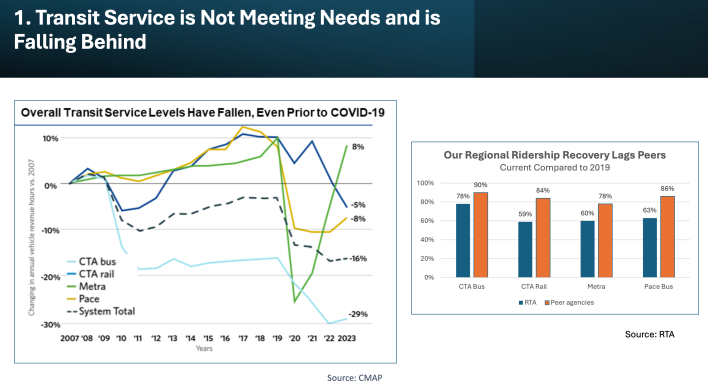
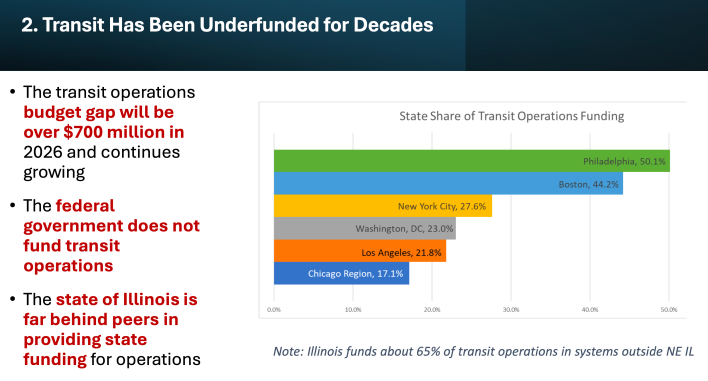
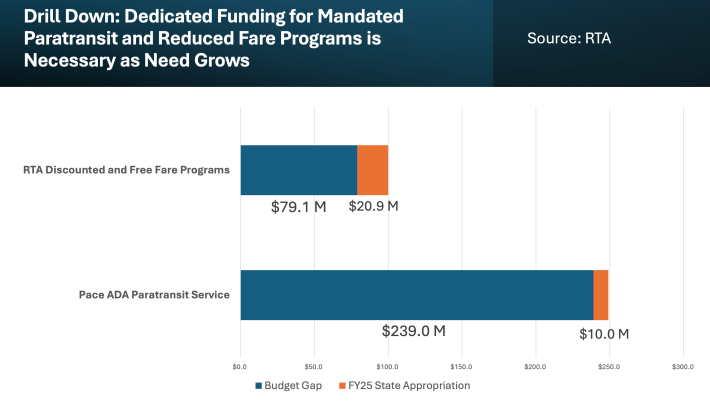
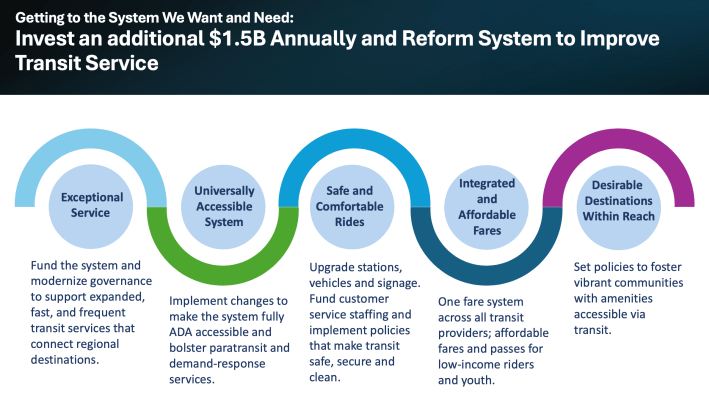
Referring to what kind of service could be provided with better-funded transit, Rynell concluded, "It's not rocket science, but our system is not structured in a way that can deliver this."
After that, Delgado presented. "I love talking transit with broads, this is great," she quipped. "I thought that I'd talk a little bit about what reforms we have discussed, and talk you through where I think we're going wind up with the bill out of the House."
The Illinois Senate passed transit reform/funding bill HB 3438 shortly before the spring legislative session ended on May 31, but the House didn't wind up voting on it. Delgado explained that there wasn't time for an informed vote before the clock struck midnight, and after that, rather than a 51 percent regular majority, a 60 percent supermajority would have been required.
Here are some slides from Delgado's presentation.
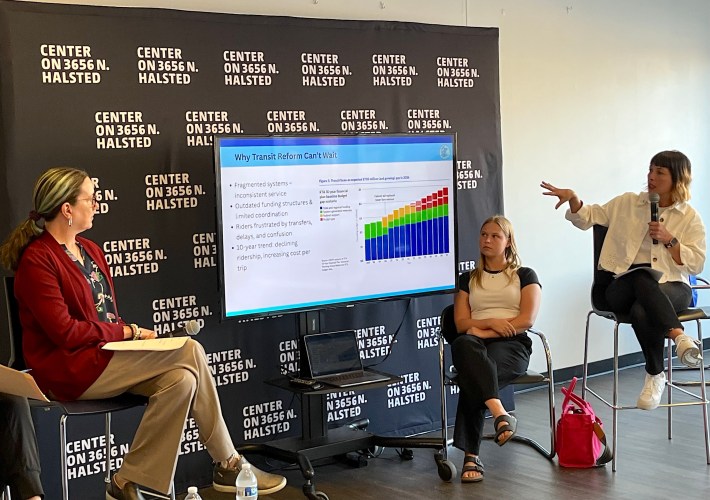
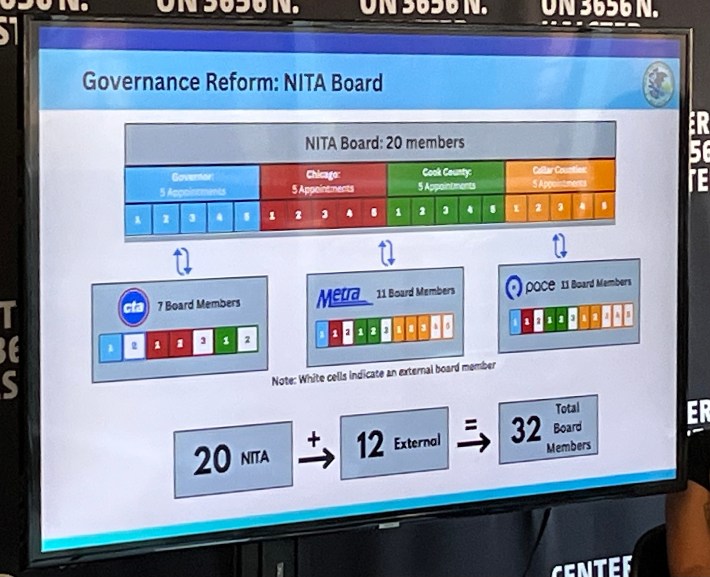
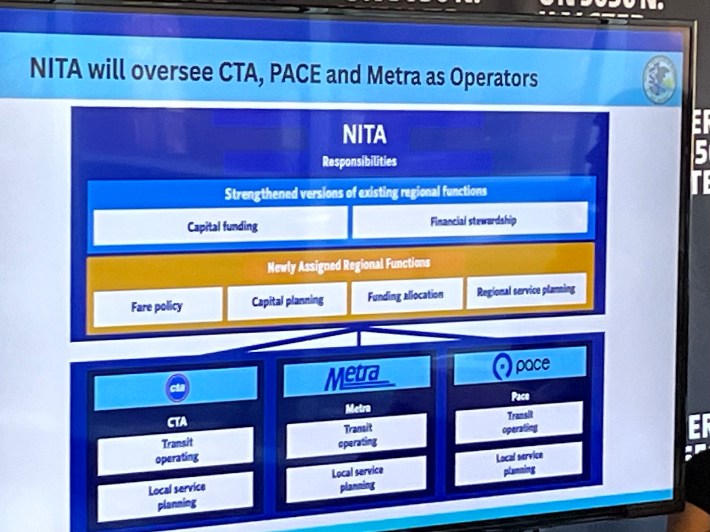
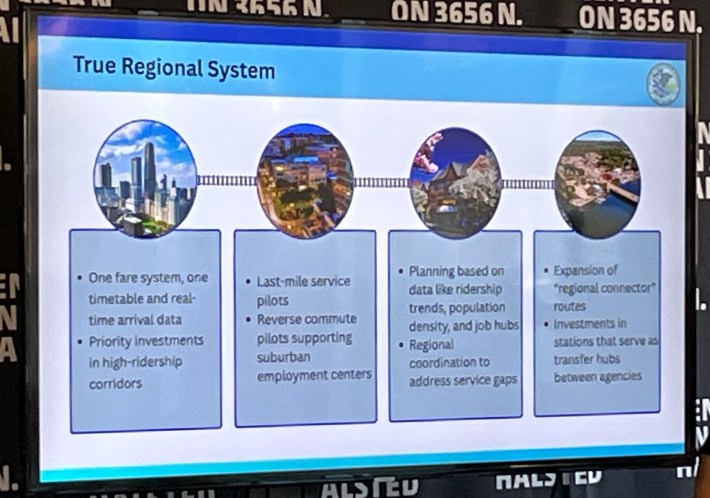
Delgado described a future that would be closer to the seamless transit systems Illinois lawmakers like her saw during a December fact-finding trip to Germany. "Having people share responsibilities is not only going to ensure better communication [between the Chicagoland agencies], but also make sure that there's less competition," she said. "We're all on the same team."
Later during the event, participants were asked to use an app to vote on whether or not they would approve of various strategies to raise money to fund the desired $1.5 billion a year. These included a $1 surcharge on $100-plus deliveries. That would be a discount compared to the $1.50 "climate impact fee" on all restaurant and retail deliveries made using motor vehicles, aka the "burrito taxi tax," that passed the Senate last spring.
Another option was a 25-cent CTS fare raise – prices haven't gone up since 2018, and a $2.50 'L' fare back then would now be worth $3.20. Another would be a 10 percent increase on all Uber and Lyft trips. Other options include new toll surcharges, fees on car rentals, a vehicle miles traveled tax for electric vehicles, and a $2-3 surcharge on large-scale events that could double as train fare, similar to the current Ravinia / Metra arrangement.
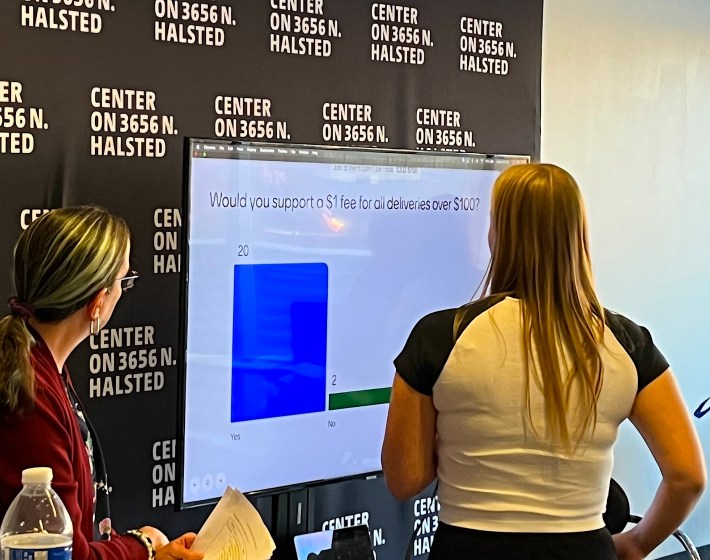
Since the room seemed to be mostly filled with transit advocates, unsurprisingly most people approved of all these methods. However, a disability rights activist in the audience expressed concern that some of these approaches, such as increasing ride-hail costs, would make life more difficult for people with special needs. Delgado replied that the working group is looking at ways to help ensure that any new charges aren't regressive.
Another attendee he said he was disappointed that most of the revenue ideas aren't focused on drivers, whereas in Singapore there's excellent transit and only rich people drive, because car ownership is exorbitantly expensive. "My question is, why are we letting the cars dominate?" he asked. "Why are we not educating the public about the value of transit? Pollution, congestion, all these things obviously make people unhappy, and those are all the reasons for public transportation... I don't think we can make much of a difference until we take on cars." The audience applauded.
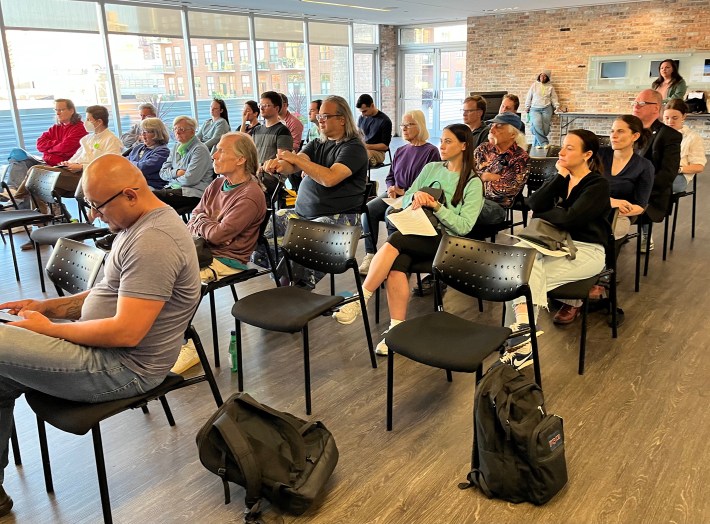
Near the end of the discussion, an attendee noted that the fiscal cliff issue has been studied and discussed for years in Chicagoland and Springfield, and yet last May, transit legislation didn't wind up on the governor's desk. "How can any if us be certain that there actually is going to be a funding bill passed?"
"I wish I could make a promise," Delgado replied. "My goal at the end of all of this is to fund a transit system for the future... I kid you not, I spent 12 hours today talking about transit, particularly with folks in the suburbs, trying to convince them that this is the right thing to do."
"This is a difficult choice," she added. "But I am an eternal optimist. I believe it is going to get done. I don't think anyone wants to be Philadelphia. One thing that has changed in the past four weeks is what we're seeing happen in Philadelphia." After Pennsylvania lawmakers failed to pass a transit funding bill, two weeks ago, SEPTA made massive service cuts, and currently plans to raise fares by 21.5 percent.
"That is making people [in Springfield] think twice about pushing this one down the road," Delgado said. "People are saying, 'We don't want to be Philadelphia.' Nobody wants to take responsibility for a failed transit system. That's a bad place to be politically in an election year."
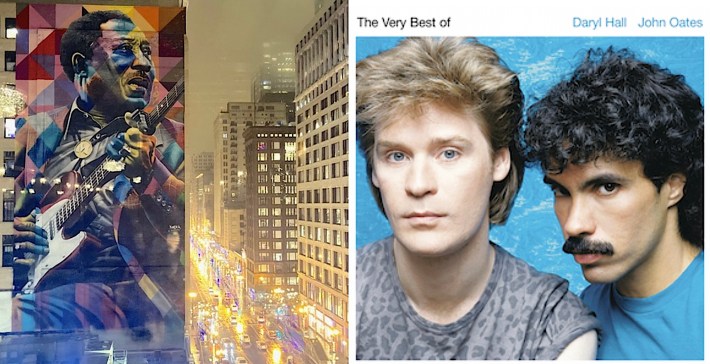
Cassidy added, "Honestly, as much as I wish we had been on the trajectory to get it done on May 31, there's nothing like going home to pissed-off constituents to motivate an elected official." The audience laughed.
"I don't want to come back and say we didn't get it done," Williams added. "I certainly don't want to face all of you without a win, so we're working really hard."

Do you appreciate Streetsblog Chicago's paywall-free sustainable transportation reporting and advocacy? We officially ended our 2024-25 fund drive in July, but we still need another $43K+ to keep the (bike) lights on in 2026. We'd appreciate any leads on potential major donors or grants. And if you haven't already, please consider making a tax-deductible donation to help us continue publishing next year. Thanks!

